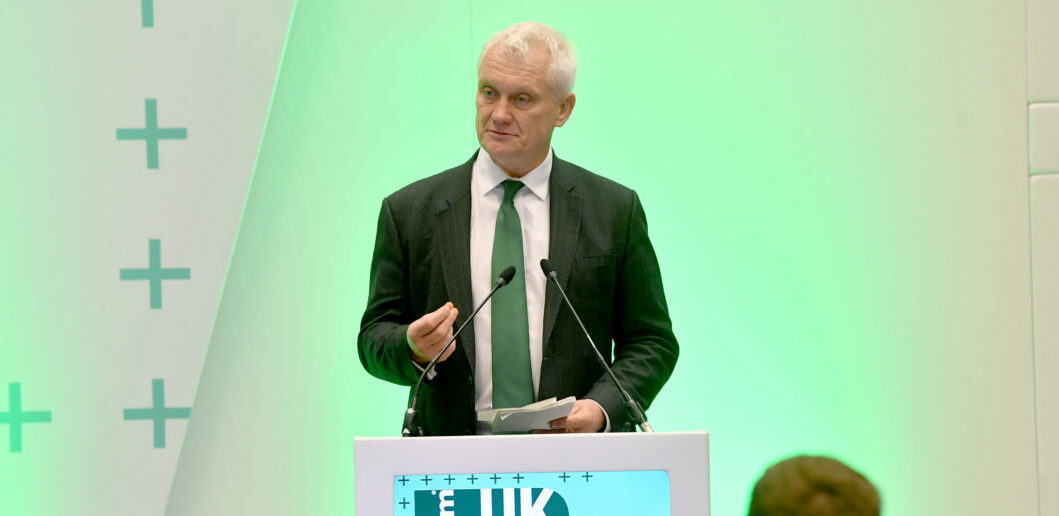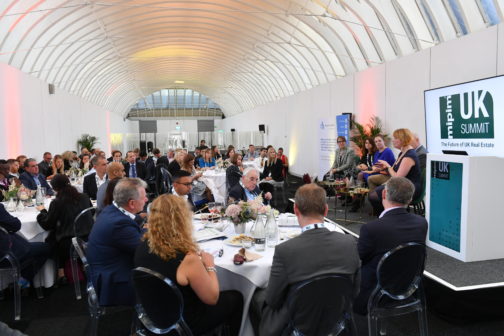Keynote address from Graham Stuart, Minister for Investment, Department for International Trade
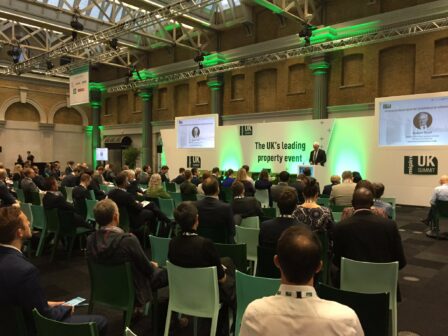
Day two of MIPIM UK Summit 2019 kicked off with a keynote address from the Investment Minister Graham Stuart, who talked about the importance of progressive local authorities around the UK taking the lead to drive regeneration of cities, as well as the wider issues around future investment in the UK.
“The scale of opportunity in Britain is pulling in investment from across the world and those investors can’t be wrong. As we leave the EU, it’s more important that we look out to the world. The UK enjoyed more foreign investment in 2018, 2 years after the Brexit referendum than any other country in Europe, a statistic you wouldn’t find in the newspapers. Over 70% of the UK population believes foreign investment is a good thing. That’s not something you find in other countries. Britain is pro-business.”
Keynote from Roger Madelin, Joint Head of Canada Water Development, British Land
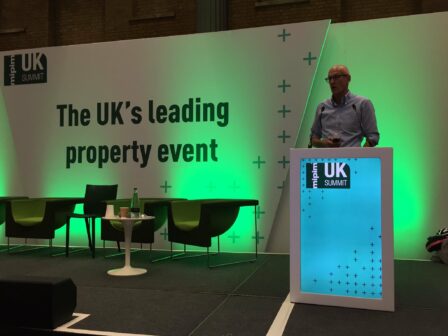
Roger Madelin of British land gave a special keynote address on investigating sustainable development best practices & future opportunities. He discussed plans for the new sustainable development at Canada Water, which will include 1200 new homes for 2500 residents as well as new spaces for work, education, restaurants, retail, leisure and entertainment.
“Looking at what we do with land is as important as what we build on it. It’s also about social sustainability and social connections, especially as mental health becomes of more importance. If you create an environment where children and families can come, you will add value to the built environment.”
Maximising the potential of world class universities
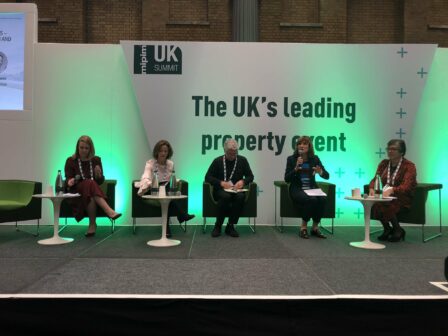
This session explored the effect world famous educational institutions have on real estate development and investment, and to what extent education is top of the list for investors when making their investment decisions.
“Investing in academia and research is critical to inclusive economic growth. We are proud of the high number of our graduates within the workforce. Barclays are now constructing a new facility in Glasgow because of the quality of the workforce. There are key investment opportunities in Scotland. A focus on research and innovation will generate new businesses and the live, work, place principle will generate new communities and regeneration opportunities,” said Ann Allen, Executive Director Estates and Commercial Services, University of Glasgow.
“Focusing on micro locations – student hubs, night life – needs to be an important factor for investors. Investment into the UK will have a steady growth and investment into student housing will continue along that trajectory,” added Erin Clarke, Relationship Director, Investec Structured Property Finance.
“Edinburgh University helped to kick start the tech sector – companies are now trying to move closer to universities to draw on their creativity and access talent,” concluded Rab Bennetts, Director, Bennetts Associates
Future mobility insights: big infrastructure projects and investment opportunities

This session covered critical large scale development projects for the UK and investment opportunities presented. The session debated projects such as HS2: will it happen and does it matter if it doesn’t, the impact of the Northern Powerhouse Rail and new wider transport infrastructure on businesses across the North of England, and the infrastructure element of the Oxford & Cambridge Arc.
Liz Peace CBE and Chairman of Old Oak and Park Royal Development Corporation opened this discussion by outlining « there’s not much point having great buildings and places if you can’t get to them… Infrastructure is key to a successful build environment. »
Andrew Jeffery, Senior Managing Partner at Ankura added to this key theme of the discussion by stressing « we’ve lost our nerve in Britain to be bold when it comes to infrastructure. »
Frank Rogers, Chief Executive Liverpool City Region Combined Authority provided some compelling insights into the benefits of infrastructure investment in the north stating: « Only 10,000 people in the north are able to access one of the 4 major northern cities within an hour… HS2 and Northern Powerhouse Rail will make a massive difference in terms of connectivity, speed and freeing up freight capacity after Brexit. »
The climate change debate, sustainable development and carbon neutral cities

With climate change high on the global news agenda, this session looked at what the built environment is doing to promote sustainable building practices.
Carolyn Dwyer, Director of the Built Environment, City of London commented “We absolutely can make a difference and have to make a difference, climate change is here…we have to act now…In my view, the Scottish government has a really good plan for sustainability and a lot of their policies are really worth reading and learning from. Commercial developments will not be investable in the future if they don’t meet the standards now.”
Marco Abdallah, Head of Engineering, Drees & Sommer UK added “The challenges that face cities in terms of technology and sustainability is that most tech initiatives fail and that’s because they’re not user friendly. The user has to accept technology. The next generation is much more open technology. I believe that this will make a very big change. A building in London typically consumes twice the energy it was designed to consume… It’s absolutely necessary that the regulation in the UK for sustainability has to be prioritised. The only solution I can see is a circular economy.”
RE-Invest Forum – Investigating the Future of UK real estate
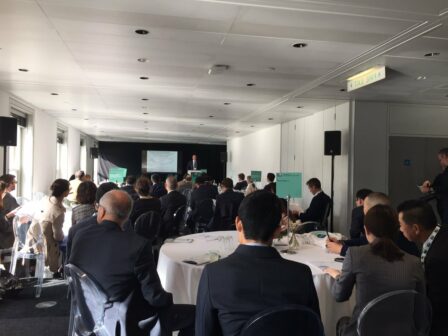
The RE-Invest Forum convened again today with over 100 UK and international investors looking at the future of UK real estate. This closed-door event included institutional pension funds, sovereign funds, insurance companies and family offices looking to understand the future of UK investment in a post-Brexit environment.
The Power of Partnerships – Public and private sector collaboration:
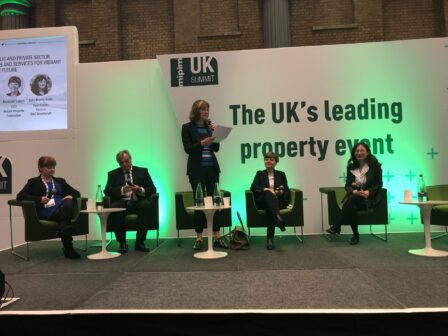
Back on the main stage this panel looked at what role the private and the public sector plays in ensuring the future attractiveness of the UK.
“The delivery of homes work better as a partnership – if you leave it to one side or the other you don’t always get the right thing,” said Sherin Aminossehe, Director of Infrastructure, Ministry of Defense.
“At BPF we offer the government a partnerships approach – The public sector can bring land and the private sector can bring investment expertise. We are ultimately trying to sell a vision to a community & show the benefits. It’s fundamental that private and public work together to create a vision for communities with lasting benefits that they will see” added Melanie Leech, CEO, British Property Federation.
“There are projects we’ve done that wouldn’t have taken off without the help of the public sector. Private investors find it easier to invest at a later stage after projects are unlocked by funding from the public sector,” concluded Sally Morris-Smith, Real Estate Partner, DAC Beachcroft.
Occupier demand – Is life science the new tech? Examining the latest developments and opportunities

This session explored growing occupier demand from the life science industry, and the latest trends, developments and opportunities for developers and investors.
Led by Harri John, Property Advisory and Workplace Transformation at Mitie, this session started with a comment from Rebecca Mortimore, Principal at HASSELL on the role of designers within this area; « our role as architects is taking away the obstacles of poor environments as much as creating new environments… We need to help facilitate the work science can do to solve problems of today. »
Colin Sinclair, Chief Executive at Sciontec provided key insights on the progress made by the city of Liverpool in providing a receptive environment for tech and life sciences, tailored to benefit the city; « we want the UK to be a world leader in science and technology, in Liverpool we want to achieve this by upskilling the local population, achieving this goal in an inclusive way that doesn’t leave behind areas of deprivation.«
Smarter Cities: Financial and development best practices from abroad

This session asked how smart, clean and digital technologies are helping cities overcome economic and societal challenges.
Alice Charles, Lead, Cities & Urbanization, World Economic Forum said: “54% of our population live in cities…they are the location where wealth is created…however 75% of our natural resources are used in cities. Cities play a critical role in innovation and sustainability. The need for us to embrace innovation and technology is vital.”
Cllr John Alexander, Leader of Dundee and Chairman, Scottish Cities Alliance:
“A really good model is the six cities in Finland, which really resonates with our Scottish Cities Alliance, and what they do is involve the private sector, who can deliver sustainable projects, when the local authorities are stretched.”
Hannah Prideaux, Business Development added: “A city is only smart when people are ready for it. If the people don’t understand the smart technology, then the city isn’t smart.”
The future of housing: Improving neighbourhoods and growing communities through partnerships

The future of housing session explored modern construction methods, in particular modular construction in relation to supply and demand and how we can improve neighbourhoods and build strong communities through partnerships. Moderating the panel discussion was EG editor in chief, Damian Wild who kicked off the session with Liverpool City Region Mayor Steve Rotheram outlining their current state of housing:
“The Liverpool city region wants to deliver housing but there has been little coordination between the 6 regions. Transport is often forgotten about & we need to have social cohesion to build a place and not just property. Focusing on quantum not quality.”
Flexible offices: Investment trends and treating occupiers as customers

This session assessed the changing dynamics in the commercial office space – such as co-working, serviced offices and agile working – and how much more is needed to attract tenants, one of which is treating occupiers as customers. Linking into this is the importance of place to health. Industry will have to more proactively consider its responsibility in preserving health and preventing sickness. The panel asked; how can we shift from our current cure-oriented approach which often acts too late and is rarely effective?
Led by Miguel Nigorra, Head of Europe at Fifth Wall, this discussion was started with a passionate statement by Méka Brunel, CEO at Gecina who said; « we have seen a complete social transformation in the way we are living, working and shopping… It’s no longer all about location location location, today, the quality of space matters and we are shifting from a focus on brick and mortar to user-centric buildings. » She added « we still need office spaces, not for desk space but because people need to socialize and network… We asked a focus group about their views on office spaces and crucially there is no difference between the older generations and millennials in terms of what they expect. »
John McRae, Director at Orms also provided insightful comment on user-centric design as a theme of design; « environments can make a huge difference to who you are and how you engage with space. To design with humans in mind and create an architecture that listens is about listening to who people are now and who they will be in the future… The workplace has finally caught up and flexible working has been a huge boost to the sector. »
Liveable Cities: Creating the most sustainable, connected, people friendly cities for good work/life balance
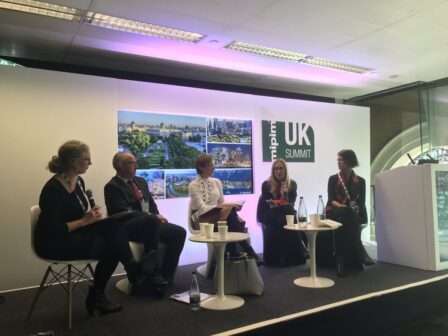
This session debated what UK cities are creating the most sustainable, connected, people friendly cities for good work/life balance. In particular, it explored in depth development and investment in key areas such as student housing, senior housing and co-living.
Kate Fearnley, Director, DTZ Investors UK:
“My top three ingredients for a liveable city are: infrastructure, employment and community. The potential to pursue a career is what drives us to a city and the factors to do with employment are what keep us in a city.”
Alexandra Steed, Director, Alexandra Steed Urban Ltd: “A walkable city is fundamental to liveability because this prioritises the people – it improves health & sociability. Furthermore, beautiful public realms and nature in the city are both also fundamental.”
Debbie Jackson, Interim Executive Director, Development, Enterprise and Environment, Greater London Authority: “London is the most liveable city from my perspective because of the level of diversity and inclusion. London is a city that also relies on public transport, which sets it apart from other UK cities which rely heavily on cars.”
Trowers & Hamlins Lunch – Positioning Cities for Prosperity
The first #MIPIMUK networking event of the day with Trowers & Hamlins for their ‘Positioning cities for prosperity’ lunch gathered built environment leaders to examine the economic and political rebalancing of cities across the UK and how it’s increasingly important to have an understanding of local context and dynamics to inform development and regeneration. Key questions were asked, such as what prosperity means to people living in our towns and cities and how do these differ across the UK and what is real estate’s role in underpinning and driving prosperity?
Housing options and innovation: How do we build and invest in what people need, want and can afford?
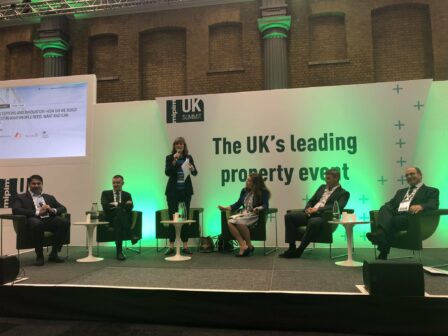
The first session after lunch explored what can be done to build and invest in what people need, want and can afford, and meet the government’s target of 300,000 new homes per year. It also looked at the extent that non-traditional housing models are supported by the public and private sectors, and explore the opportunities and challenges for them backing these new models.
“What we build is the same as 150 years ago. There’s a crisis of affordability, accessibility, design & sustainability. We have a deeply conservative industry and we need investors to be proud of developments made by new modes of construction” said Nick Walkley, Chief Executive, Homes England.
The future of retail and town centre regeneration: Examining the latest projects, best practices, investments and future visions

The manner that people use towns and cities has changed and is constantly evolving. This session explored these changes and what can be done to address them. It examined the latest developments, projects, best practices and investments in the sector to try and find answers. It also shared future visions of towns and city centres, and provided an overview for developers and investors as to the opportunities presented.
Led by Stacey Meadwell, Freelance Property Writer and Editor, this session first discussed the idea of the ‘death of the high street’. Speaking on the topic Rachel Fisher, Deputy Director Regeneration and Infrastructure MHCLG said « publications that talk about the death of the high street conflate the death of a place with the change of a sector… In reality, high streets always change and this just a new phase. People want more of an experience than just the chance to wander through shops.«
Andrew Carter, Chief Executive, Centre for Cities highlighted an important point in stating « high streets that are doing well are not completely reliant on retail. They have other non-commercial activities going on. » Agreeing with this sentiment; « we are lucky in the UK to have places with heritage and customs, we need to take this, use it and create towns which are unique for people to work, play and visit » said Bill Grimsey, Retailer.
London Plan: Latest developments, challenges and opportunities
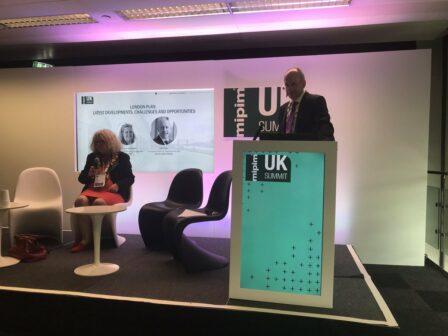
Jules Pipe, Deputy Mayor of London for Planning Regeneration and Skills was interviewed by Sue Brown, Executive Director Planning and Development, London First on the London plan.
“London’s one of the most innovative, entrepreneurial, desirable places to live. It’s a magnet for global investors. On the face of it, we’re looking really prosperous. However, there are challenges that we face in our endeavour to ensure good growth. The plan has to be read as a whole, all the matters addressed provide particular strategic advice…one of the central clear messages of the plan is that we need innovative approaches, as a key to the success of London’s future. There isn’t anyone who says ‘we don’t need Crossrail 2, we don’t need the Bakerloo extension’, but we are really fragmented on the matter of transport infrastructure, we agree that it needs attention, but we don’t have a unified voice for this.”
Creation Property Network & BPF Futures: Engaging the next generation of talent

This multi-generational panel focused on diversity, inclusion and collaboration within real estate.
“How can we build vibrant communities if we don’t represent our community in our work force?” Melanie Leech discusses British Property Federation’s communication initiative to redefine real estate & change the perception on the lack of diversity in the industry.
“The property industry needs to do more to advertise itself & show that this is a career possibility, such as going into schools and providing mentoring opportunities.” Olajide Alade, Graduate, NHS Property Services, shared his view on how the industry can take steps towards diversity.
Cultural infrastructure and placemaking: Its role in positioning a city as a destination and value creation
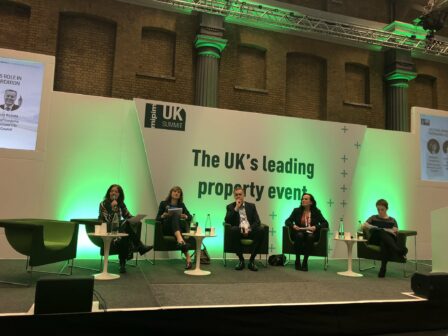
This session chaired by Fiona Bruce looked at new developments in cultural infrastructure and how placemaking shapes the future of UK cities.
“Funds for cultural allocation need to be part of initial and not additional costs – we need to flip the thinking. ‘Including culture in your development’ – an Urban Art Forum guide for developers and the built environment will help bridge gaps,” said Sherry Dobbin, Partner, Futurecity.
“Royal Albert Dock in Liverpool was a regeneration project with culture at its heart. The area has Grade 1 listed buildings, Tate Liverpool has transformed its image and culture has played a key role in this,” said Tony Reeves, Chief Executive, Liverpool City Council.
Logistics investment: Trends, issues, challenges and opportunities

The logistics sector is at the vanguard of the 4th industrial revolution, undergoing massive and relentless change. What does this mean for investors, developers, service providers and end users? This afternoon we heard leading market experts discuss how they are meeting the challenges and taking advantage of the opportunities arising from this positive disruption.
Presentations from Christian Muller, Strategy and Research Manager at CBRE Global Investors and Paul Makin, Investment Director at Warehouse REIT drew out major trends in the logistics sector this afternoon. Makin stated; « this is all about the internet and is a structural change. In 2013 there was only a 3% online retail take up in the big box market, in 2018 this was above 20%. This isn’t a cyclical change, it is structural. »
Peter Ward, Chief Executive UKWA stressed that « the logistics industry is going through an immense, rapid and unprecedented change. This has largely come about through technology and commerce with more goods coming from online retailers than from the high street. » He also added « in the era of climate change, which I believe will be the agenda for this generation, the old centre-of-gravity rule book is being ripped up. »
The Cambridge & Oxford Arc: Latest developments, challenges and opportunities

This session will explored the opportunity for economic and housing growth in the Oxford-Cambridge Arc. Richard Harrington, Chief Executive, Buckinghamshire Thames Valley LEP asked: “Why is the Arc attractive? It’s about transformational growth, innovation, capability and the ability to transcend sectors and bring them together to create new commercial opportunity.”
Nigle Tipple, Chief executive, Oxfordshire Local Enterprise Partnership (OxLEP) added: “One of the biggest challenges was realising that if we want genuine significant investment coming into the area, we’ve got to collaborate. It’s about the people who work & live in our communities. We’re not trying to bolt communities together.”
Sarah Greenwood, Head of Strategic Growth, Homes England: “The Arc is about the economy. What we have to think about is where are the economic clusters? Are we putting the homes in the right places? Our goal is to provide homes that people want to live in, in places they want to live in.”
Diversification in hospitality: trends, developments and investment opportunities

This session explored how the hospitality sector is diversifying to remain attractive. As the traditional business model is changing, what are the new concepts and answers to this evolution?
Adam Maclennan, Managing Director, PKF hotelexperts Ltd, chaired this discussion turning first to Matt Walton, Development Director UK&I, IHG who stressed that « as an asset class, the hotel industry is very resilient and is therefore key for investment. It has the longevity as well- everyone needs somewhere to stay. » He also added « the flow of people and retention of talent will be key for the sector. Hotels and hospitality are not seen as long term careers, more as a summer job, and big businesses need to do something about that. »
Contributing an architects’ perspective, Chin Lin, Senior Hotel and Resort Architect at HKS Architects pointed out that « everyone is searching for a differentiator these days, everyone is trying to be new. We’ve seen a huge surge in wellness aspects- medical treatments as well as spa packages… It’s an exciting time in terms of mixed use stuff.«
Modernise or Die: Achieving numbers of homes at pace and addressing skills, jobs and the environment

As the UK faces shortages in labour and delivery capability, this session will examine the importance of modern methods of construction (MMC). What new housing typologies are being trialled through innovative use of MMC?
Pooja Agrawal, Co-Founder, Public Practice said: “The planning system is often blamed for slow developments in MMC, but there is an issue with capacity – the skills needed are a fundamental issue. One aspect to consider is upscaling people who already work in the public sector.”
Mark Farmer, Founding Director & CEO, Cast Real Estate & Construction Consultancy added: “As we get more & more completed projects with state of the art MMC status, developers need to use them as exemplars to educate the industry. The key thing that the public sector need to do is show leadership…It’s all about responsible innovation, moving the industry forward one step at a time – it’s an unproven platform…We have a lack of data on the failures of MMC, you have to build the development, display it and learn from it.”
UK Leaders Summit: Is the economy being rebalanced?

Featuring regional mayors and a Scottish Government Minister, this session debated the extent to which central government is rebalancing the UK’s economy. Questioning, does the UK’s real estate future lie outside London and are global investors buying into this trend? In addition, the session looked at what more can be done to promote opportunities across the whole of the UK and how local strategy can play a part in all this.
Steve Rotheram, Metro Mayor of the Liverpool City Region said: “The regions play a pivotal role in the success of the country… Cambridge is flying the life science and technology flag within the UK and into Europe.” He added that “The UK has the most unbalanced economy.. Rebalancing can only start with the government giving us power and resources – devolution. We currently can’t target where we would like to spend particular funds.”
Tim Bowles, Mayor, West of England Combined Authority echoed this sentiment, “By giving us the tools and resources, we can deliver results better and quicker than Whitehall. We need certainty but it comes down to being able to make decisions financially within our region. We know our place & people, we just need the power.”
